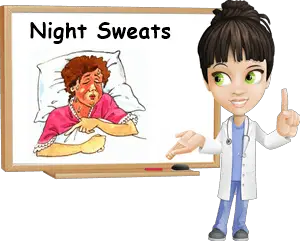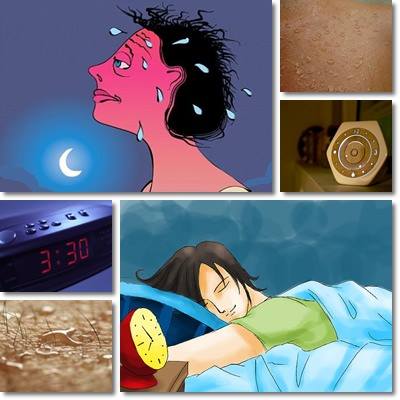Many of us have probably dealt with night sweats at least once in our lives, in some cases without even being aware of it happening to us. Should the condition be a benign occurrence, stress management, dietary and lifestyle changes such as ensuring an adequate temperature in the room during sleep and wearing cotton pajamas that allow the skin to breathe are sufficient measures to prevent night sweats. Other times, underlying medical conditions responsible for night sweats need to be investigated and dealt with accordingly in order for the symptoms to subside.
What are night sweats?
True night sweats are when you wake up sometime during the night and feel your clothes, pillow case and bed sheets are so wet with perspiration (sweat) that they need to be changed immediately. Night sweats should not be confused with hot flashes (feeling warmth spreading throughout your body in seconds), which are brief and mild, meaning they last for seconds up to a couple of minutes and do not result in perspiration soaked clothes and bed sheets.

In most cases, night sweats are nothing more than a normal reaction of heat regulation occurring when our body feels too hot and were shown to occur quite often even in perfectly healthy individuals. However, there are times when excessive night sweating may prove to be a symptom of a more serious health issue that will require the attention of a trained physician. Unless you are sleeping in a hot room, have a high fever due to the flu or like to cover yourself with too many blankets which will cause anyone to feel warms and sweat, even excessively, then you might be suffering from night sweats.
What causes night sweats?
Menopause
Women approaching menopause, even by several years, usually experience hot flashes which may range in intensity from mild to severe and occur both during the day and during the night and, as a result, may be confused with true night sweats. However, hot flashes are usually accompanied by other characteristic symptoms such as flushing or mood changes, which should help differentiate the two. Still, women approaching menopause may experience both night sweats and hot flashes.
Idiopathic hyperhidrosis
Idiopathic hyperhidrosis, referring to a medical condition which causes the palms of one’s hands, soles of the feet, underarms, face, back or entire body to sweat excessively, without any identifiable medical cause. Idiopathic hyperhidrosis is a benign cause of night sweats.

Bacterial, viral, fungal infections
According to the medical community, infections of any kind may result in night sweats. For example, catching the flu will most likely cause high fever and excessive night sweating because the immune system is raising the body’s temperature in an attempt to reduce virus numbers and help the body fight the infection.
Tumors
There is a small chance that night sweats are caused by tumors such as endocrine tumors or lymphoma (lymphatic cancer). In such cases, night sweats are usually accompanied by other symptoms, notably fever and visible and inexplicable weight loss, sometimes localized pain of varying intensity.
Medication
Several types of medication, notably heart disease medication (nitroglycerin), antidepressants, antibiotics and antipyretics (paracetamol, aspirin) can cause night sweats. I remember that a few years back I was prescribed an antibiotic for an urinary tract infection. During the treatment period, I was woken by my mother because I had sweated so much that the bed sheets, pillow case and my pajamas were soaking wet. I had experienced night sweats without even knowing, all because of an antibiotic.
Abnormal blood glucose (sugar) levels
Interesting enough, fluctuations in one’s blood sugar levels can significantly affect the body’s thermoregulation mechanisms and result in night sweats. Spikes in blood sugar levels caused by a high intake of foods rich in refined (white) sugar are often the culprit behind excessive night sweating.
Hormonal disorders
Hormonal imbalances are quite troublesome in the sense that any fluctuation may result in debilitating conditions such as hyperthyroidism and cause apparently inexplicable symptoms like weight loss or weight gain, goiter, night sweats and so on.
What to do about it: tips and solutions
If you are a fairly healthy individual who experiences night sweats on a regular basis, the smartest thing to do is to talk to your doctor to eliminate the possibility of an underlying serious medical condition which might be causing your night sweats (hormone imbalance, for example). Be completely honest about diet, lifestyle, medication and do not be afraid. Night sweats alone are a manageable condition which might be immensely improved by making some serious dietary and lifestyle changes. Caffeine, hot drinks, acidic and spicy foods, alcohol, refined sugar, smoking, stress and heat all trigger night sweats and may worsen an existing condition.
Find out below my 10 tips on how to deal with night sweats caused by idiopathic hyperhidrosis:
Reduce your caffeine intake
You can reduce your caffeine intake by eating less chocolate and drinking less coffee, caffeinated beverages such as green tea, black tea or white tea and fizzy drinks or sodas. Caffeine exerts a stimulant effect which may act as a trigger for sweating and lead to night sweats. Also see 6 reasons why coffee is bad for you.
Avoid hot drinks at nighttime before bed
Avoid drinking hot beverages such as hot tea before bedtime. Or coffee. Or hot chocolate. Or warm milk or golden milk. Warm or hot liquids cause sweating and can accentuate night sweats.
No acidic foods and beverages
To stop night sweats, avoid acidic foods such as citrus fruit and citrus juices, fermented foods or pickles, vinegar dressings and alcoholic beverages which are known to cause acid reflux, heartburn and, surprisingly, also night sweats, particularly when consumed at dinner or right before going to sleep.
No spicy foods or heavily seasoned dishes
Exclude spicy foods from your diet if you are experiencing night sweats and avoid eating heavily seasoned foods. Spicy foods and anything heavily seasoned have an irritating effect on mucosas, including the stomach lining, and can easily cause stomach acidity and acid reflux which commonly manifests as heartburn. Heartburn can be so severe it can have you wake up drenched in sweat in the middle of the night.
No alcoholic beverages
Alcohol is believed to both cause and worsen night sweats. It’s simply best to avoid it completely. Not only does it dehydrate and predispose to nutritional deficiencies, it also causes and worsens existing digestive conditions, especially acid reflux disease. Find out more on what foods to eat and to avoid for acid reflux.
Monitor your sugar intake
A high intake of refined sugar can trigger night sweats. Eating too much sugar in general means you are used to a higher level of sugar in your blood. But once your body processes the sugar and levels in the blood drop, that drop can produce some severe symptoms, from lightheadedness, dizziness, nausea, vomiting, fainting sensation to anxiety, feelings of panic and night sweats. A balanced diet can prevent major fluctuations in your blood sugar levels and, consequently, also symptoms such as dizziness, fainting or night sweats.
Improve sleeping conditions
A hot room, lack of air conditioning, use of too many blankets or inappropriate nightclothes will cause excessive sweating. Try to adapt your sleeping conditions and clothing to your needs. Turn up the air conditioning a bit, open a window, use a fan, dress lightly and wear loose fitting nightclothes made from cotton or other natural fabrics.
Manage stress
Because stress is another important trigger of night sweats, try to detach yourself from your worries, work and problems and find a few moments to relax before going to bed. Whether you go out for a walk, watch a movie, listen to music or just find some time for yourself, make self-care a priority in your life by practicing it regularly.
Avoid cigarette smoke
If you are experiencing debilitating night sweats that interfere with your normal routine, you might want to avoid cigarette smoke.
Manage your allergies
It would appear that allergic reactions to pollen can cause night sweats as well. Make sure you keep yourself away from allergens that might be triggering such reactions. Change your clothes first thing when you come home and leave your shoes at the door. Wash you hands, face and even hair to get rid of pollen from the outside. Use an air filter and change your bedsheets regularly.
Conclusion
Night sweats can be harmless or not. Identifying the cause behind them is the first step towards addressing the condition and may require a visit to your doctor. Following guidelines for preventing excessive sweating, such as wearing clothes that let the skin breathe, regulating room temperature, avoiding potentially problematic foods such as coffee and caffeinated beverages, extremely spicy foods or foods that cause acid reflux can help prevent night sweats and greatly improve sleep quality.
